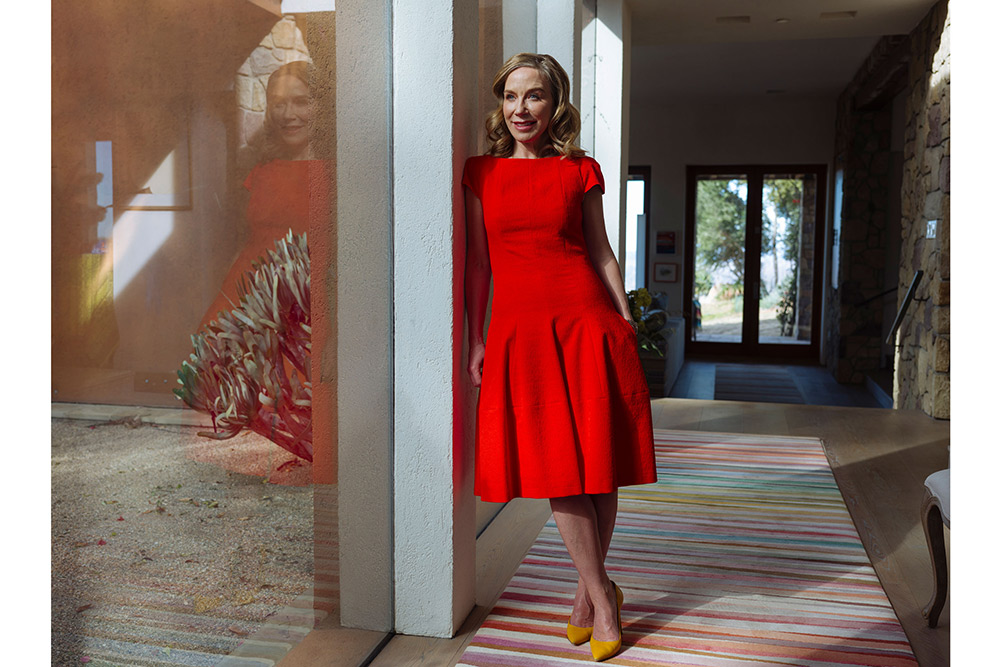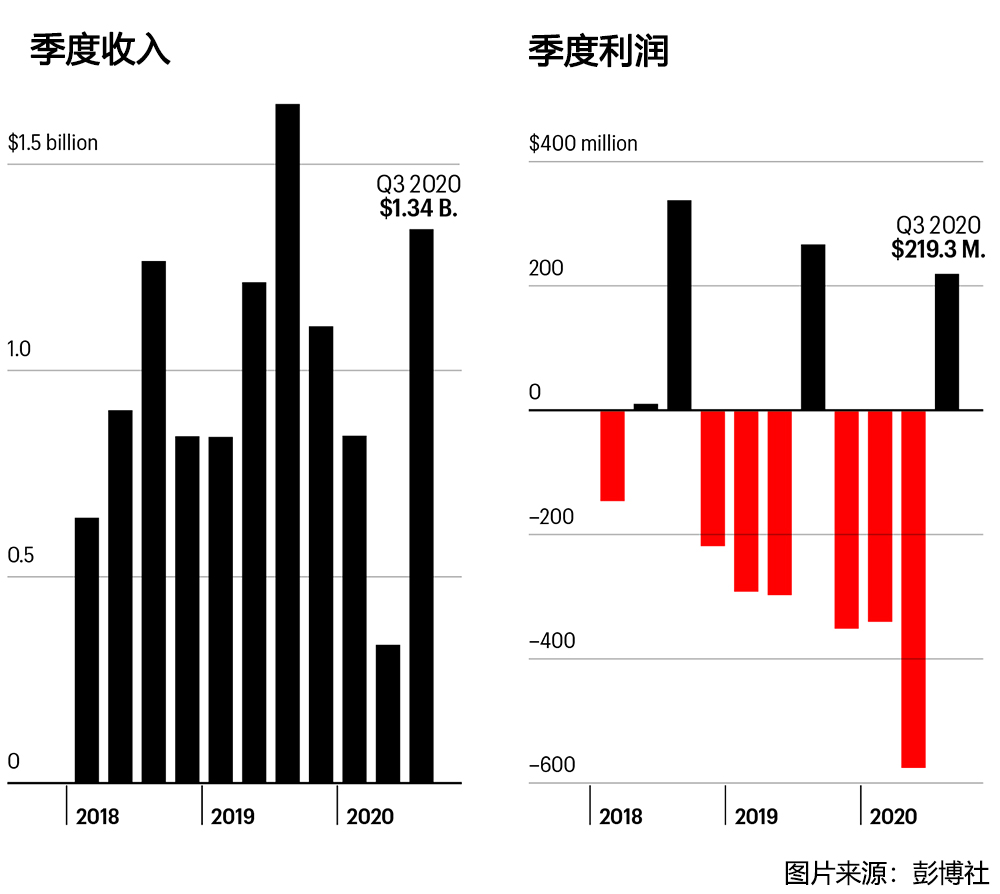1月初,一些爱彼迎房东也就是在平台出租房屋的人们齐聚线上。本次视频会议由爱彼迎托管业务主管凯瑟琳·鲍威尔组织,主要是讨论疫情后的旅游市场。与会者显然对当前的惨状心有余悸。
其中一位是来自圣安东尼奥的房东,她谈到会议市场放缓导致出租马车公寓变得很困难。英国出生的鲍威尔在洛杉矶的家中同情地回应:“我们没法‘变出’会议来,”她说,“但有没有什么我们能帮忙的吗?”
事实上,总部位于旧金山的爱彼迎也没什么办法遏制疫情。不过在过去几个月里,公司一直在努力倾听房东的声音,关注他们的需求——用联合创始人兼首席执行官布莱恩·切斯基的话说,这是回归爱彼迎的“根”。具体想法是什么?那就是快乐的房东能让房客也快乐,而且是很多房客。(不管是从房东还是房客身上,爱彼迎都能获得收入。)

讽刺的是,这部分重启工作均由新加入公司的鲍威尔领导。鲍威尔曾在迪士尼乐园担任高管,2020年1月疫情开始在全球肆虐时刚刚在爱彼迎走马上任。刚开始,她负责领导爱彼迎刚刚起步的“体验”产品,房东可以提供例如在怀基基岛与救援犬一起划桨,在里斯本与“反串皇后”共同制作桑格里亚酒等项目。去年7月管理层改组后,鲍威尔承担了新角色,主要是将爱彼迎的核心业务,即房源信息与新体验相结合。“她承担了巨大的责任,”爱彼迎三位联合创始人之一乔·格比亚说。
不管是鲍威尔在爱彼迎首次亮相还是升职,都赶上了公司发展的关键时刻。去年春天,新冠疫情摧毁了需求,短短8周内业务下滑达80%。5月初,爱彼迎解雇了25%的员工,对2008年成立以来一直高速增长的公司来说这是非常清醒的一步。公司借了20亿美元,还推迟了备受期待的上市进程。
随后的12月初,爱彼迎终于进入公开市场,成为2020年最大规模的IPO。上市首日公司股价就翻了一番多,市值略超过1000亿美元,超过了酒店巨头万豪、希尔顿和凯悦市值总合。虽然投资者在市场上追捧爱彼迎,公司本身还是难以持续盈利。去年截至9月,公司亏损增加了一倍多,达到近7亿美元,销售额则下降了32%至25亿美元,都是疫情直接导致的后果。

预计短期内不会完全恢复。Stifel分析师斯考特·德威特称,爱彼迎的租赁需求要到2023年才能恢复到疫情前水平。另一位Needham的分析师布拉德·埃里克森最近写道,疫情可能成为“持续多年的逆风”,迫使公司在吸引客户(包括房东和房客)方面投入更多资金,从而阻碍增长并拖累盈利。
鲍威尔的工作正是从此开始。她的任务是吸引新房东,并维持现有400多万房东。这项任务并不容易。不过鲍威尔对大规模业务并不陌生。她在迪士尼曾领导全球12万名“演员”,“演员”是迪士尼对主题公园员工的称呼。“她的背景和技能都很完美,”苹果前零售主管,爱彼迎董事会成员安吉拉•阿伦茨说。
鲍威尔入职爱彼迎的时间虽然不长,但一直努力帮房东发声。
疫情爆发不久,她在接手新工作后不过几周时就开始亲自面对房东。1月初这场会议是她组织的第30场视频聚会。(为了利用视频会议时间,她还专门买了跑步机办公桌,也算是疫情副产品。)她还帮助协助创建了理事会,方便房东参与爱彼迎的决策。

“她的本能之举(直接跟房东谈)跟我们早期管理公司的方式非常类似,”格比亚说,“之前我们走遍全美国见房东,举办活动聚会,跟他们谈,想办法把产品做好。”
现在格比亚和爱彼迎其他联合创始人已经没法亲自去见每个房东,倾听房东的需求也没那么容易。如今,公司在全球10万多个城市都有度假房源,几乎每个国家都有人出租房间。但鲍威尔还是努力直接听取房东的意见,然后据此制定实际政策和协议,包括实施她帮助设计的疫情期间五步清洗流程。“我学了很多关于消毒的知识,”她笑着说。
鲍威尔表示,最近禁止爱彼迎上架房源组织超过16人聚会的“派对禁令”也是跟房东对话的结果。此前不久,加州萨克拉门托一家爱彼迎度假出租酒店举行了一场特殊派对,三人遭枪杀。“公司希望确保你们能掌控自己的房屋,在出问题之前就加以遏制,”去年8月鲍威尔在一段视频中告诉房东们,“这意味着对派对和大群人更加严格。”
但是,对房东友好并不一定能获得房客认可,确保双方都乐意非常棘手。疫情来袭时,爱彼迎向最后一刻不得不取消预订的房客提供退款,并称退款是在公司“酌情处理”政策下进行的。很多房东抱怨收入损失,最终由公司弥补了部分损失。最近,随着新一波疫情出现又引起新一波取消预订,爱彼迎选择支持房东。不管房东采取何种取消政策公司都支持,此举激怒了一些房客。
这段插曲只是疫情期间爱彼迎匆忙应对紧急情况的新案例。“这是非常不确定的时期,”鲍威尔被问到公司必须做出艰难决定时说。可以肯定的是,爱彼迎确实处理了各种棘手的情况。不仅要跟加强监管短租的城市斗争,还要在平台上处理种族歧视事件,这还只是随便列举出的两个公司不得不应对的复杂问题。
然而以上提到的问题还在疫情重创旅游业之前。爱彼迎首席执行官切斯基表示,即使一切恢复“正常”,人们的旅行习惯也会永久性改变,具体来说是商务旅行减少,探亲访友的个人旅行将增加。在鲍威尔看来,自己的工作是不管新现实什么样,都要确保房东做好准备。“我不知道未来是什么样,”鲍威尔说,“我工作的重心是帮助和激励(房东)做好准备,从而满足新需求。”
这也是为何鲍威尔最近率先推出在线控制面板,以方便房东随时了解本地区的旅游趋势。至于自己的度假计划,她打算在能安全旅行后去英国见家人,“当然了,”她补充说,“也顺便拜访英国的房东们。”(财富中文网)
译者:梁宇
审校:夏林
1月初,一些爱彼迎房东也就是在平台出租房屋的人们齐聚线上。本次视频会议由爱彼迎托管业务主管凯瑟琳·鲍威尔组织,主要是讨论疫情后的旅游市场。与会者显然对当前的惨状心有余悸。
其中一位是来自圣安东尼奥的房东,她谈到会议市场放缓导致出租马车公寓变得很困难。英国出生的鲍威尔在洛杉矶的家中同情地回应:“我们没法‘变出’会议来,”她说,“但有没有什么我们能帮忙的吗?”
事实上,总部位于旧金山的爱彼迎也没什么办法遏制疫情。不过在过去几个月里,公司一直在努力倾听房东的声音,关注他们的需求——用联合创始人兼首席执行官布莱恩·切斯基的话说,这是回归爱彼迎的“根”。具体想法是什么?那就是快乐的房东能让房客也快乐,而且是很多房客。(不管是从房东还是房客身上,爱彼迎都能获得收入。)
讽刺的是,这部分重启工作均由新加入公司的鲍威尔领导。鲍威尔曾在迪士尼乐园担任高管,2020年1月疫情开始在全球肆虐时刚刚在爱彼迎走马上任。刚开始,她负责领导爱彼迎刚刚起步的“体验”产品,房东可以提供例如在怀基基岛与救援犬一起划桨,在里斯本与“反串皇后”共同制作桑格里亚酒等项目。去年7月管理层改组后,鲍威尔承担了新角色,主要是将爱彼迎的核心业务,即房源信息与新体验相结合。“她承担了巨大的责任,”爱彼迎三位联合创始人之一乔·格比亚说。
不管是鲍威尔在爱彼迎首次亮相还是升职,都赶上了公司发展的关键时刻。去年春天,新冠疫情摧毁了需求,短短8周内业务下滑达80%。5月初,爱彼迎解雇了25%的员工,对2008年成立以来一直高速增长的公司来说这是非常清醒的一步。公司借了20亿美元,还推迟了备受期待的上市进程。
随后的12月初,爱彼迎终于进入公开市场,成为2020年最大规模的IPO。上市首日公司股价就翻了一番多,市值略超过1000亿美元,超过了酒店巨头万豪、希尔顿和凯悦市值总合。虽然投资者在市场上追捧爱彼迎,公司本身还是难以持续盈利。去年截至9月,公司亏损增加了一倍多,达到近7亿美元,销售额则下降了32%至25亿美元,都是疫情直接导致的后果。
预计短期内不会完全恢复。Stifel分析师斯考特·德威特称,爱彼迎的租赁需求要到2023年才能恢复到疫情前水平。另一位Needham的分析师布拉德·埃里克森最近写道,疫情可能成为“持续多年的逆风”,迫使公司在吸引客户(包括房东和房客)方面投入更多资金,从而阻碍增长并拖累盈利。
鲍威尔的工作正是从此开始。她的任务是吸引新房东,并维持现有400多万房东。这项任务并不容易。不过鲍威尔对大规模业务并不陌生。她在迪士尼曾领导全球12万名“演员”,“演员”是迪士尼对主题公园员工的称呼。“她的背景和技能都很完美,”苹果前零售主管,爱彼迎董事会成员安吉拉•阿伦茨说。
鲍威尔入职爱彼迎的时间虽然不长,但一直努力帮房东发声。
疫情爆发不久,她在接手新工作后不过几周时就开始亲自面对房东。1月初这场会议是她组织的第30场视频聚会。(为了利用视频会议时间,她还专门买了跑步机办公桌,也算是疫情副产品。)她还帮助协助创建了理事会,方便房东参与爱彼迎的决策。
“她的本能之举(直接跟房东谈)跟我们早期管理公司的方式非常类似,”格比亚说,“之前我们走遍全美国见房东,举办活动聚会,跟他们谈,想办法把产品做好。”
现在格比亚和爱彼迎其他联合创始人已经没法亲自去见每个房东,倾听房东的需求也没那么容易。如今,公司在全球10万多个城市都有度假房源,几乎每个国家都有人出租房间。但鲍威尔还是努力直接听取房东的意见,然后据此制定实际政策和协议,包括实施她帮助设计的疫情期间五步清洗流程。“我学了很多关于消毒的知识,”她笑着说。
鲍威尔表示,最近禁止爱彼迎上架房源组织超过16人聚会的“派对禁令”也是跟房东对话的结果。此前不久,加州萨克拉门托一家爱彼迎度假出租酒店举行了一场特殊派对,三人遭枪杀。“公司希望确保你们能掌控自己的房屋,在出问题之前就加以遏制,”去年8月鲍威尔在一段视频中告诉房东们,“这意味着对派对和大群人更加严格。”
但是,对房东友好并不一定能获得房客认可,确保双方都乐意非常棘手。疫情来袭时,爱彼迎向最后一刻不得不取消预订的房客提供退款,并称退款是在公司“酌情处理”政策下进行的。很多房东抱怨收入损失,最终由公司弥补了部分损失。最近,随着新一波疫情出现又引起新一波取消预订,爱彼迎选择支持房东。不管房东采取何种取消政策公司都支持,此举激怒了一些房客。
这段插曲只是疫情期间爱彼迎匆忙应对紧急情况的新案例。“这是非常不确定的时期,”鲍威尔被问到公司必须做出艰难决定时说。可以肯定的是,爱彼迎确实处理了各种棘手的情况。不仅要跟加强监管短租的城市斗争,还要在平台上处理种族歧视事件,这还只是随便列举出的两个公司不得不应对的复杂问题。
然而以上提到的问题还在疫情重创旅游业之前。爱彼迎首席执行官切斯基表示,即使一切恢复“正常”,人们的旅行习惯也会永久性改变,具体来说是商务旅行减少,探亲访友的个人旅行将增加。在鲍威尔看来,自己的工作是不管新现实什么样,都要确保房东做好准备。“我不知道未来是什么样,”鲍威尔说,“我工作的重心是帮助和激励(房东)做好准备,从而满足新需求。”
这也是为何鲍威尔最近率先推出在线控制面板,以方便房东随时了解本地区的旅游趋势。至于自己的度假计划,她打算在能安全旅行后去英国见家人,“当然了,”她补充说,“也顺便拜访英国的房东们。”(财富中文网)
译者:梁宇
审校:夏林
In early January a handful of Airbnb hosts—the people who rent their homes on the vacation booking service—gathered online. The videoconference, organized by Catherine Powell, chief of Airbnb’s hosting business, was meant for discussing post-pandemic travel. But the attendees clearly had current events on their minds.
One, a woman from San Antonio, talked about how the slowdown in conventions was making it tough to rent out her carriage-house apartment. From her home in Los Angeles, the British-born Powell offered sympathetic responses: “We can’t ‘magic’ conventions,” she said. “But how can we help?”
Indeed, there’s not a lot Airbnb can do to wish away the pandemic. But over the past few months, the company has tried to listen to its hosts and to prioritize their needs—a return to Airbnb’s “roots,” in the words of cofounder and CEO Brian Chesky. The thinking? Happy hosts make for happy guests, and lots of them. (Airbnb gets a cut from both sides, hosts and guests.)
Ironically, much of this revival is led by Powell, a new addition to the San Francisco–based company. The longtime Disney theme parks executive was brought on board in January 2020, just as COVID-19 was starting to spread around the globe. Initially, she was tasked with heading Airbnb’s fledgling “experiences” product, which lets hosts offer tours like paddleboarding with rescue dogs in Waikiki and sangria-making with drag queens in Lisbon. But after a management shake-up in July, Powell was promoted to a new role that has combined Airbnb’s core business—home listings—with its newer experiences. “She’s assumed an immense amount of responsibility,” says Joe Gebbia, another of Airbnb’s three cofounders.
Powell’s debut at Airbnb, and her promotion, have come at a critical juncture in Airbnb’s trajectory. Last spring, COVID-19 demolished demand, causing an 80% drop in business in just eight weeks. In early May, Airbnb laid off 25% of its employees, a sobering step for a company that has been in hyper-growth mode since its founding in 2008. It also borrowed $2 billion and delayed a much-anticipated initial public offering.
Then, in early December, Airbnb finally made its public market debut—the biggest IPO of 2020. Airbnb shares more than doubled in the company’s first day of trading, valuing it at just over $100 billion—more than that of hotel giants Marriott, Hilton, and Hyatt combined. But even as investors clamor for a piece of Airbnb, it is still struggling to become consistently profitable. During the nine months ended in September, the company’s losses more than doubled to nearly $700 million, while sales tumbled 32% to $2.5 billion, a direct result of COVID-19.
A full recovery isn’t expected anytime soon. According to Stifel analyst Scott Devitt, demand for Airbnb rentals won’t return to pre-pandemic levels until 2023. Another analyst, Brad Erickson of Needham, recently wrote that COVID-19 could turn into a “multiyear headwind” that could force the company to spend more on attracting customers (both hosts and guests), hampering growth and delaying profitability.
That’s where Powell comes in. Her mandate: to reel in new hosts and to keep the more than 4 million existing ones. That’s no easy task. But Powell isn’t a stranger to scale. At Disney, she oversaw 120,000 global “cast members”—Disney-speak for theme park employees. “She’s got the perfect background and skills,” says Angela Ahrendts, Apple’s former retail chief and an Airbnb board member.
In her short time at Airbnb, Powell has tried to ensure that the voices of hosts are heard.
Shortly after the pandemic hit, just weeks into her new job, she started personally meeting with them—the gathering in early January was her 30th such get-together over video. (Another byproduct of the pandemic and all of the time she now spends in virtual meetings: Powell bought a treadmill desk.) She also helped create a board where hosts could weigh in on Airbnb’s decisions.
“Her instinct [to talk directly to hosts] is very commensurate and parallel to how we ran the company in the early days,” says Gebbia. “We would travel around the country to meet hosts, we would throw events and meetups to talk to them to figure out how to make the product better.”
Listening to hosts isn’t as easy as it used to be in the days when Gebbia and Airbnb’s other co-founders could actually meet and onboard each one in person. Today, the company has vacation listings in more than 100,000 cities worldwide, with people renting out their homes in almost every country. But Powell’s efforts to hear directly from hosts has led to real policies and protocols, including the implementation of a five-step COVID cleaning process she helped design. “I’ve learned a lot about sanitizing,” she says, laughing.
The company’s recent “party ban,” which prohibited gatherings of more than 16 people at Airbnb listings, was also a direct result of conversations with hosts, according to the exec. The ban came shortly after one particular party at an Airbnb vacation rental in Sacramento, Calif. ended up with three people being shot. “We want to make sure you have control over your space and that we help to stop problems before they start,” Powell told Airbnb's community of hosts in a video message last August. “That means being more strict on parties and large groups.”
But pleasing hosts doesn’t always equate with pleasing guests, and making sure that both are happy is a tricky business. When the pandemic hit, Airbnb provided refunds to guests who had to cancel their bookings at the last minute, saying the reimbursements were covered under the company’s “extenuating circumstances” policy. Many hosts complained about the lost income, and the company eventually covered some of those losses. More recently, as another COVID-19 surge caused a new wave of cancellations, Airbnb stood by its hosts. Whatever cancellation policy hosts had would still apply, a decision that angered some guests.
The episode is just one more example of how Airbnb has had to adapt on the fly during the pandemic. “It’s a very uncertain time,” Powell says when asked about the tough decisions the company has had to make. To be sure, Airbnb has dealt with all sorts of tricky situations in the past. Battling cities that are trying to more heavily regulate it, and addressing incidents of racial discrimination on its platform are just two examples of the types of complexities the company has already had to grapple with.
That was all before COVID-19 wreaked havoc on the travel industry. Even after things go back to “normal,” Airbnb CEO Chesky predicts people’s travel habits will be forever changed: There will be less business travel and more personal travel to visit family and friends. As for Powell, she sees it as her job to make sure that hosts are prepared, whatever the new reality. "I don't know what it's going to look like," says the exec. "But my focus is to help and inspire [our hosts] to be ready to meet those new needs."
That’s why Powell recently spearheaded an online dashboard that keeps hosts updated on travel trends in their regions. As for her own vacation plans, as soon as it’s safe to travel again, she intends to visit her family in the U.K. “And,” she adds, “visit our British hosts.”






